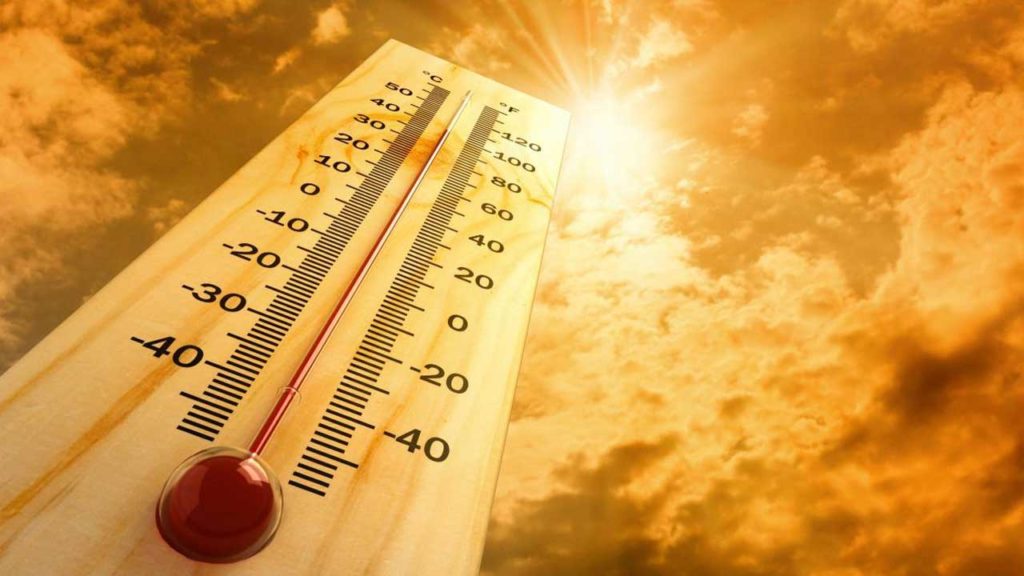For some weeks now, it has been a comparison between the heat waves in Lagos and Abuja as residents in the two cities lament extreme temperatures. However, the truth is that everywhere in Nigeria is hot and this is driving people uncomfortable. On Twitter, a user shared a clip of his bottled petroleum jelly that melted in Kaduna’s 41°C heat. Some people have even compared the experience to hell while others are “calling on God for help.”
https://twitter.com/MakuoFour/status/1110923164509499393
What are heat waves?
Heat wave is a period of time of abnormally hot weather like the one currently experienced across Nigeria. Continuous exposure to such heat condition could result in heat cramps, heat exhaustion, heat stroke and even death. In the US annually, more people die as a result of extreme heat than floods, tornadoes, hurricanes, lightning, and earthquakes combined according to an article in the American Journal of Preventive Medicine. In 2002, a heat wave that hit Maiduguri in northeast Nigeria left more than 60 people dead. But even with their severity, extreme heat events do not get as much attention as other disasters possibly because everyone tends to forget about them after everything cools down to normal.
Before heat waves occur, series of other events must have preceded. Take population and urbanization for examples. Half of Nigerians now live in cities and this number will increase in years to come. Lagos alone currently houses about 20 million people (that is like the population of Malawi and Liberia combined). As population increases and people move into cities, the need to build more houses increase with the cost being clearing natural vegetation that keeps a balance in the environment.
In 2002, a heat wave that hit Maiduguri in northeast Nigeria left more than 60 people dead. But even with their severity, extreme heat events do not get as much attention.
With the rise in concrete-walled buildings and tarred roads and vehicles that radiate heat, the risk of heat waves only increases. And when we burn fuels from our cars and industries, the resulting carbon dioxide gas which fires up into the sky and forms a blanket traps heat in the atmosphere. It is this trapped heat that disrupts the atmospheric temperature and come back at us as heat waves.
What can we do now that we’re here?
Elderly people, children, and those living alone are more exposed to the risks of illnesses due to extreme heat. So it is important to always keep a tab on them and ensure they are safe and well. Among other things that you could do, keep the following in mind to stay safe:
- Staying away from alcoholic beverages, narcotics and stressful outdoor physical activities may be a smart thing to do during this period. Because any of these activities could increase dehydration and the risk of suffering heat-related illnesses.
- Stay in a well-ventilated, air-conditioned space always. Don’t lock yourself up in a room with heat. When you are indoor, an air-conditioner is preferred to a fan – a fan blows warm air that is warmer than your body temperature and this could ultimately increase the risk of heat stress.
- Try to keep your water filler/bottle close at all times so that you are always hydrated. If you could donate a water dispenser at your office or school for other people, that would be really great. Once you feel discomfort from the heat, take frequent showers and wear light (colour and weight) cloths. I hope that your supervisor at work would not need any convincing for leniency on choice of cloths in this period.
- It may also be a good time to visit a garden for some fresh and cool air. The cool atmosphere of the garden could provide a break from the clumsiness and hotness of other surrounding areas.

How about in the long run?
As a long term plan, we may want to start calling on our governors and policymakers to intensify efforts on greening our cities. In your home, plant trees around you as these will come as saviors next time everywhere becomes hot again. Plants help to stabilize extreme heat by producing water that cools the surrounding air through evapotranspiration. Those who keep gardens are lucky as they are less likely to feel as much heat as those who do not.
May be it is also a good time now to have a chat about climate change and what is responsible with your colleagues at work or school. More often than not, we associate disasters to celestial bodies forgetting the role that we have played in the past. Talk to people about the lifestyle change that could save us all from worse consequences. I hope that everyone will see a connection between all the fuel and refuse burning and the rising temperature.
What other things do you think people should know about to stay safe in this heat wave period?

